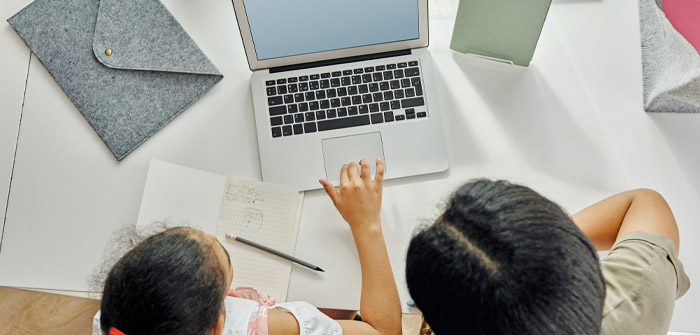(Photo | by August de Richelieu from Pexels)
Even in a “normal” year, back-to-school time can bring on anxiety for many kids. This year, thanks to coronavirus concerns, that anxiety is more widespread than ever. With a multitude of unknowns, we’ve asked two back-to-school experts to come up with some strategies to help us manage these new unknowns. While there is no one correct or easy answer, there are things we can do to take the anxiety down a few notches.
Look back before looking ahead.
“Plan for the worst. Hope for the best,” is what Emily Levitt, vice president of Education at Sylvan Learning, recommends. “This spring, schools were faced with making quick decisions. They learned what worked and what didn’t, and they’re building plans around this insight. Families can, too.” Levitt recommends that parents talk with their kids about how their remote learning experiences worked (or didn’t work) last spring so you can be better prepared for what’s ahead.
For example, did your kid love talking on WebEx calls or did they “check out?” It’s easy to hide in a gallery view of 30 classmates. If your child avoided group calls or disengaged, be ready to build in more one-on-one learning with the teacher or an outside resource. Be your child’s advocate for making this happen.
Practice patience.
“We don’t have any concrete information about what school will look like, so it’s easy to ask: ‘What are we preparing for?’” says clinical psychologist Tori Cordiano, who is also director of Research at the Laurel School’s Center for Research on Girls.
She recommends parents lead by example when it comes to handling change. “Our calm has to set the calm for our kids. You can’t say, ‘you have to be flexible’ when you the parent aren’t.”
In other words, even though I’m feeling stressed that our school hasn’t announced firm plans yet, I need to practice saying, “I’m sure they’ll let us know as soon as they can,” in a nice, calm tone.
Cultivate acceptance.
This is a tough one. Who doesn’t want to return to normal? “Routines sustain us,” says Cordiano. “When this started in the spring, many kids had the mentality that, ‘If this is finite, we can make it work.’ But it’s not. If you have rising juniors and seniors, teens going away to college, they want to know how the uncertainty will affect their plans.” Cordiano recommends that parents help their kids handle this anxiety using honesty and coping techniques. “Of course we will feel anxious. It’s helpful to let kids know that it’s a normal response. The key is to show them how to manage their anxiety.” One way to do that is to cultivate acceptance around what you can and can’t control. You could say, for example, “We can’t control what school might look like in the fall. However, we can control washing our hands and wearing a mask to help keep us safe.”
Take it one semester at a time.
Be upfront with your child about the fact that whatever the plan is at the beginning of the school year might not be the plan throughout. “Tackle it semester by semester, month by month. You can’t tackle an entire year. Treat every day like there can be snow the next day — take everything home,” advises Levitt. It’s also important to look at the good in the situation. What are your kids learning about handling change and uncertainty? “Traditionally, education has been slow to change,” says Levitt. “With COVID-19 closures, educators are being challenged to take risks and be experimental. If you look at education as a whole, that’s a huge silver lining. We’re going to learn so much about what works well for kids. This could propel education forward.”
Remember, Sylvan is here for you no matter what back-to-school time looks like this fall! Check out our new offerings including School Support at Sylvan for your virtual learning days, in-person and online tutoring, STEM enrichment, SAT/ACT prep and more.





